#eddard xv
Text
“Lord Eddard, tell me… why is it always the innocents who suffer most, when you high lords play your game of thrones?”
hey look it’s the point of the book literally spelled out for us 🙃
0 notes
Text




Every Arya & Lyanna parallel:
→ harrenhal
LYANNA
Ned remembered the moment when all the smiles died, when Prince Rhaegar Targaryen urged his horse past his own wife, the Dornish princess Elia Martell, to lay the queen of beauty's laurel in Lyanna's lap. He could see it still: a crown of winter roses, blue as frost.
— A Game of Thrones, Eddard XV
The king was wroth, and even sent his son the dragon prince to seek the man, but all they ever found was his painted shield, hanging abandoned in a tree.
— A Storm of Swords, Bran II
"The tourney Lord Whent staged at Harrenhal beside the Gods Eye, in the year of the false spring. A notable event. [...] "But that was the tourney when he crowned Lyanna Stark as queen of love and beauty!" said Dany.
— A Storm of Swords, Daenerys IV
ARYA
It wasn't Harren, Arya wanted to say, it was me. She had killed Chiswyck with a whisper, and she would kill two more before she was through. I'm the ghost in Harrenhal, she thought. And that night, there was one less name to hate.
— A Clash of Kings, Arya VII
Barefoot surefoot lightfoot, she sang under her breath. I am the ghost in Harrenhal.
— A Clash of Kings, Arya IX
I'm not an evil child, she thought, I am a direwolf, and the ghost in Harrenhal. She put her broomstick back in its hiding place and followed him from the godswood.
— A Clash of Kings, Arya IX
476 notes
·
View notes
Text

“Ned Stark reached out his hand to grasp the flowery crown, but beneath the pale blue petals the thorns lay hidden.”
- Eddard XV
#lyanna stark#asoiaf#valyrian scrolls#my art#tfw you draw an entire piece based on a quote and realize when youre about to post it that you made the roses the wrong shade of blue…#roses are hard to draw ok?
203 notes
·
View notes
Text

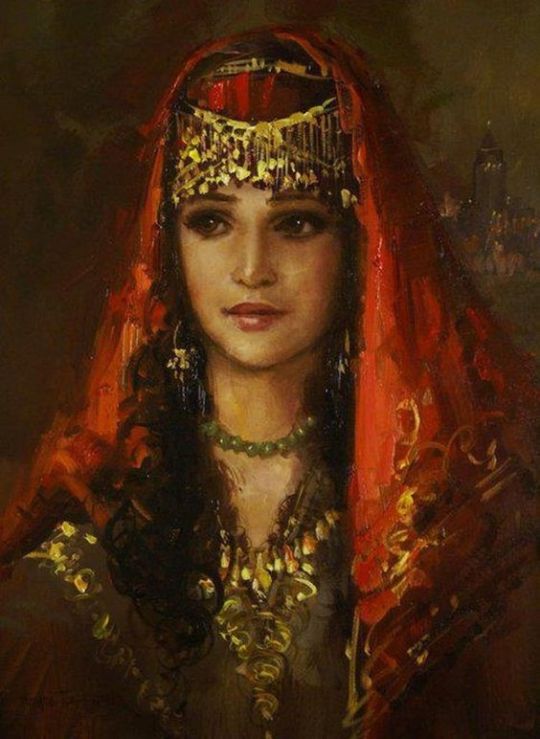





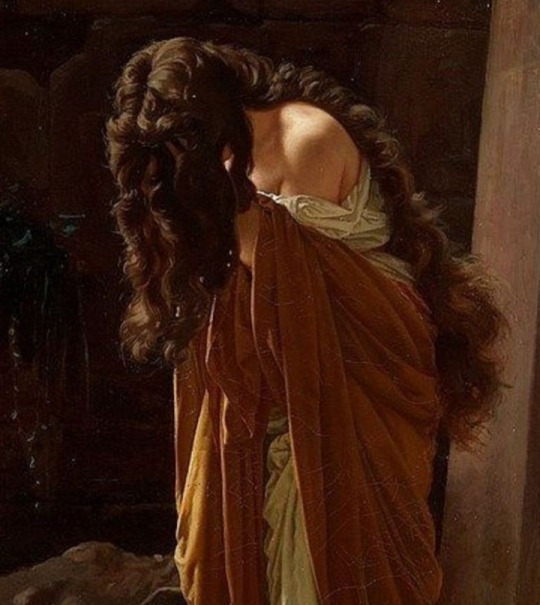
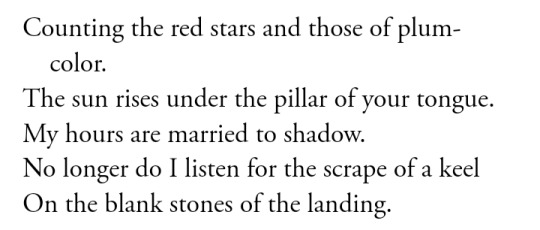
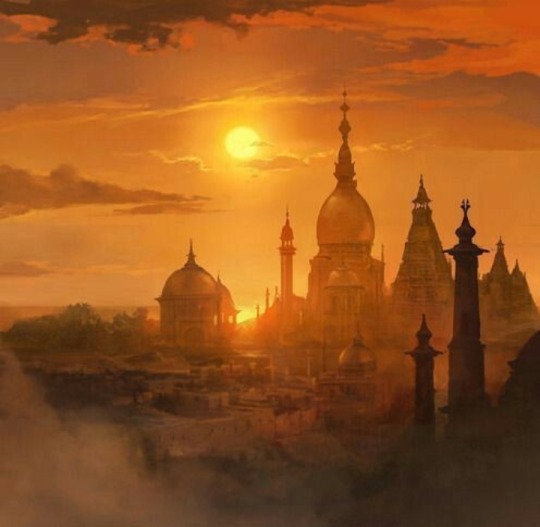
Tyrion IV ASOS / Portrait of A Lady by Remzi Taşkıran / Eddard XV AGOT / Portrait of A Lady by Sir Francis Bernard Dicksee / War and Peace by Leo Tolstoy / Semper Vivit Amor by Eugen von Blaas / Bang Bang (My Baby Shot Me Down) by Cher / Penitent Magdalene by Antonio Ciseri / The Colossus by Sylvia Plath / Sunspear by Juan Carlos Barquet
Martell Week Day 1 - Favorite Martell: Princess Elia Nymeros Martell of Dorne
#martell week#elia martell#elia nymeros martell#elia of dorne#web weaving#asoiaf#a song of ice and fire#house martell
283 notes
·
View notes
Text

“He heard his laughter in the dark, saw his eyes, blue and clear as mountain lakes.” -AGOT Eddard XV
“The apprentice lifted his face. Ned studied the shape of his jaw, the eyes like blue ice.” -AGOT Eddard VI
Robert was a summer king but Gendry belongs to winter.
Bonus:
“When she spied Gendry, his bare chest was slick with sweat, but the blue eyes under the heavy black hair had the stubborn look she remembered.” 🥹
#robert baratheon#gendry#eddard stark#arya stark#game of thrones#a song of ice and fire#asoiaf#through the books Baratheon’s blue eyes are on the table#i wonder if its mean something#i know tully’s have blue eyes too but not mentioned as much as baratheons#henry as robert of course#and soon i’ll come new things i noticed about gendry#gendrya
59 notes
·
View notes
Text
Top 5 times Cersei did the opposite of mourning Robert
5.Cersei had become very fond of boar since Robert's death. -Cersei V, aFfC
4.Robert Baratheon, the First of His Name, may there never be a second. A dim, drunken brute of a man. Let him weep in hell. -Cersei VII, aFfC
3.[Tyrion, to Cersei:]"Is this the bed where Robert died? I'm surprised you kept it."
"It gives me sweet dreams," she[Cersei] said. -Tyrion VI, aCoK
2. [Cersei, to Tyrion:] [...] "You should have been at the [Robert's funeral] feast, Tyrion. There has never been a boar so delicious. They cooked it with mushrooms and apples, and it tasted like triumph."
[Tyrion:] "Truly, sister, you were born to be a widow." -Tyrion I, aCoK
1.The queen wore a high-collared black silk gown, with a hundred dark red rubies sewn into her bodice, covering her from neck to bosom. They were cut in the shape of teardrops, as if the queen were weeping blood. -Sansa IV, aGoT
(for ref: Yet when the jousting began, the day belonged to Rhaegar Targaryen. The crown prince wore the armor he would die in: gleaming black plate with the three-headed dragon of his House wrought in rubies on the breast. -Eddard XV, aGoT)
#valyrianscrolls#asoiaf meta#asoiaf#cersei lannister#tyrion lannister#sansa stark#ned stark#may he weep in hell#happy murderous meowmeow monday!#(c)lsb
82 notes
·
View notes
Note
Why do most of the people in asoiaf fandom think that 'lyanna clutching blue rose even during her last hour as a symbol of r&l love'. For me blue rose signify as the only thing that reminded of her home in a faraway foreign land and how much she's missing her home and family ?
I feel the same, sort of. Within the books, it's a symbol linked to the North and to Winterfell and to Stark maidens, to the children that result from their stealing, to the violence inherent in it, and to the absolutely doubtful nature of their consent.
"No. They had been in Winterfell all the time, hiding with the dead beneath the castle. The maid loved Bael so dearly she bore him a son, the song says . . . though if truth be told, all the maids love Bael in them songs he wrote. Be that as it may, what's certain is that Bael left the child in payment for the rose he'd plucked unasked, and that the boy grew to be the next Lord Stark. So there it is—you have Bael's blood in you, same as me."
(ACOK, Jon VI)
The maid's love and consent is entirely optional and in question and it is utterly highlighted here by GRRM. He did not have to do that. He could have just let Ygritte (who herself is not picky when it comes to consent) tell that story without the insert. But he put it there. He put it there with the Ellipses of Significance, no less. The uncertainty is deeply intentional. Why would he do that?
But also significant in that exchange is that the maid is the rose. The rose is a symbol of the northern maid. They are dead as she lays dying.
Promise me, she had cried, in a room that smelled of blood and roses. Promise me, Ned. The fever had taken her strength and her voice had been faint as a whisper, but when he gave her his word, the fear had gone out of his sister's eyes. Ned remembered the way she had smiled then, how tightly her fingers had clutched his as she gave up her hold on life, the rose petals spilling from her palm, dead and black. After that he remembered nothing. (AGOT, Eddard I)
She wasn't clutching the roses. She was cluthing his hands. The spilling rose petals were dead and black. This is supposed to be romantic imagery?
He was walking through the crypts beneath Winterfell, as he had walked a thousand times before. The Kings of Winter watched him pass with eyes of ice, and the direwolves at their feet turned their great stone heads and snarled. Last of all, he came to the tomb where his father slept, with Brandon and Lyanna beside him. "Promise me, Ned," Lyanna's statue whispered. She wore a garland of pale blue roses, and her eyes wept blood.
(AGOT, Eddard XIII)
Her eyes weep blood. Is this supposed to be romantic imagery?
Ned remembered the moment when all the smiles died, when Prince Rhaegar Targaryen urged his horse past his own wife, the Dornish princess Elia Martell, to lay the queen of beauty's laurel in Lyanna's lap. He could see it still: a crown of winter roses, blue as frost.
Ned Stark reached out his hand to grasp the flowery crown, but beneath the pale blue petals the thorns lay hidden. He felt them clawing at his skin, sharp and cruel, saw the slow trickle of blood run down his fingers, and woke, trembling, in the dark.
Promise me, Ned, his sister had whispered from her bed of blood. She had loved the scent of winter roses.
(AGOT, Eddard XV)
In Ned's dream, the flower crown is aggressively attacking his hands - the very hands that Lyanna clutched in her dying - and it is ironically juxtaposed with her former love of this scent. The flower was turned into a weapon, subverted into nothing but agony. A poisoned gift.
Is this supposed to be romantic imagery?
#anti rhaegar targaryen#anti rhaegar x lyanna#winter rose#the way doom and despair hang over this flower crown#and we're supposed to consider this a symbol of love?
92 notes
·
View notes
Text
The thought of Cat was as painful as a bed of nettles. He wondered where she was, what she was doing. He wondered whether he would ever see her again. -- Eddard XV, AGOT
----
“I have no sister.” The words were knives. What do you know of my heart, priestess? What do you know of my sister?
Melisandre seemed amused. “What is her name, this little sister that you do not have?”
“Arya.” -- Jon VI, ADWD
Not exact parallel, but each quote always reminds me of the other.
37 notes
·
View notes
Text

Rhaenys Day for Sun Dragon weekend
"𝘙𝘩𝘢𝘦𝘯𝘺𝘴 𝘸𝘢𝘴 𝘢 𝘤𝘩𝘪𝘭𝘥 𝘵𝘰𝘰. 𝘗𝘳𝘪𝘯𝘤𝘦 𝘙𝘩𝘢𝘦𝘨𝘢𝘳'𝘴 𝘥𝘢𝘶𝘨𝘩𝘵𝘦𝘳. 𝘈 𝘱𝘳𝘦𝘤𝘪𝘰𝘶𝘴 𝘭𝘪𝘵𝘵𝘭𝘦 𝘵𝘩𝘪𝘯𝘨, 𝘺𝘰𝘶𝘯𝘨𝘦𝘳 𝘵𝘩𝘢𝘯 𝘺𝘰𝘶𝘳 𝘨𝘪𝘳𝘭𝘴. 𝘚𝘩𝘦 𝘩𝘢𝘥 𝘢 𝘴𝘮𝘢𝘭𝘭 𝘣𝘭𝘢𝘤𝘬 𝘬𝘪𝘵𝘵𝘦𝘯 𝘴𝘩𝘦 𝘤𝘢𝘭𝘭𝘦𝘥 𝘉𝘢𝘭𝘦𝘳𝘪𝘰𝘯, 𝘥𝘪𝘥 𝘺𝘰𝘶 𝘬𝘯𝘰𝘸? 𝘐 𝘢𝘭𝘸𝘢𝘺𝘴 𝘸𝘰𝘯𝘥𝘦𝘳𝘦𝘥 𝘸𝘩𝘢𝘵 𝘩𝘢𝘱𝘱𝘦𝘯𝘦𝘥 𝘵𝘰 𝘩𝘪𝘮. 𝘙𝘩𝘢𝘦𝘯𝘺𝘴 𝘭𝘪𝘬𝘦𝘥 𝘵𝘰 𝘱𝘳𝘦𝘵𝘦𝘯𝘥 𝘩𝘦 𝘸𝘢𝘴 𝘵𝘩𝘦 𝘵𝘳𝘶𝘦 𝘉𝘢𝘭𝘦𝘳𝘪𝘰𝘯, 𝘵𝘩𝘦 𝘉𝘭𝘢𝘤𝘬 𝘋𝘳𝘦𝘢𝘥 𝘰𝘧 𝘰𝘭𝘥, 𝘣𝘶𝘵 𝘐 𝘪𝘮𝘢𝘨𝘪𝘯𝘦 𝘵𝘩𝘦 𝘓𝘢𝘯𝘯𝘪𝘴𝘵𝘦𝘳𝘴 𝘵𝘢𝘶𝘨𝘩𝘵 𝘩𝘦𝘳 𝘵𝘩𝘦 𝘥𝘪𝘧𝘧𝘦𝘳𝘦𝘯𝘤𝘦 𝘣𝘦𝘵𝘸𝘦𝘦𝘯 𝘢 𝘬𝘪𝘵𝘵𝘦𝘯 𝘢𝘯𝘥 𝘢 𝘥𝘳𝘢𝘨𝘰𝘯 𝘲𝘶𝘪𝘤𝘬 𝘦𝘯𝘰𝘶𝘨𝘩, 𝘵𝘩𝘦 𝘥𝘢𝘺 𝘵𝘩𝘦𝘺 𝘣𝘳𝘰𝘬𝘦 𝘥𝘰𝘸𝘯 𝘩𝘦𝘳 𝘥𝘰𝘰𝘳."
-AGOT Eddard XV
#a song of ice and fire#rhaenys daughter of rhaegar#rhaenys targaryen daughter of rhaegar#rhaenys targaryen#sun dragon 2024#sun dragon weekend 2024
18 notes
·
View notes
Text
PSA: Blue Winter Roses
It seems that there is a misunderstanding of what (and who) blue winter roses represent in ASOIAF. Some people use them rather freely as a means of symbolizing a Stark maiden but I’m afraid that doesn’t track with what’s been shown in the text.
Throughout the text, blue winter roses are almost exclusively presented within the context of Lyanna Stark and R+L=J. We’re told that Prince Rhaegar gave Lyanna a crown of blue winter roses at the Tourney of Harrenhal.
Ned remembered the moment when all the smiles died, when Prince Rhaegar Targaryen urged his horse past his own wife, the Dornish princess Elia Martell, to lay the queen of beauty’s laurel in Lyanna’s lap. He could see it still: a crown of winter roses, blue as frost.
- Eddard XV, AGOT
Rhaegar crowned Lyanna as the Queen of Love and Beaty with the winter roses. And it’s important to mention that this crown was placed in Lyanna’s lap which is near her womb.
This is not the only mention of winter roses as pertaining to Lyanna. Throughout his chapters, Ned associated Lyanna with winter roses and many times, he even gave the added context of a promise he made to her. So the roses are usually connected to Rhaegar, Lyanna, and a promise throughout Ned’s chapters. They even become an important part of the visual imagery surrounding Lyanna’s death; she dies presumably due to complications during child birth.
Promise me, she had cried, in a room that smelled of blood and roses. Promise me, Ned. The fever had taken her strength and her voice had been faint as a whisper, but when he gave her his word, the fear had gone out of his sister’s eyes.
- Eddard I, AGOT
So Lyanna’s last moments smell of blood and roses and then we have the added context of a promise, which we think is Lyanna asking Ned to protect her son.
Ned remembered the way she had smiled then, how tightly her fingers had clutched his as she gave up her hold on life, the rose petals spilling from her palm, dead and black.
- Eddard I, AGOT
Now we have a mention of dead roses, which fall as Lyanna dies. But the death of these roses does not indicate the death of Rhaegar and Lyanna’s love. This is because Ned has just promised to preserve a life - the life of Lyanna’s child. So the roses might be dead but the child, the son of the bard prince and Lady Stark, lives.
Remember when Prince Rhaegar placed a crown of winter roses near Lyanna’s womb? Well, Lyanna’s womb became fruitful and bore a son. The blue winter roses placed near her womb have now been replaced by a living, breathing child. That child is Jon Snow.
Then in ACOK, Ygritte tells Jon a story about Bael the Bard. Bael was a king-beyond-the-wall who, to make a long story short, climbed Winterfell’s walls and pretended to be a singer named Sygerrik of Skagos. He wined and dined from Lord Stark’s table and when told to name a price for his entertainment, asked only for a flower from the Lord of Winterfell’s garden.
‘All I ask is a flower,’ Bael answered, ‘the fairest flower that blooms in the gardens o’ Winterfell.’
- Jon VI, ACOK
Lord Stark gave him the flower but when the morning came, Bael had disappeared and had taken with him Lord Stark’s daughter. A blue winter rose was all that was left on Lady Stark’s bed.
“Her bed they found empty, but for the pale blue rose that Bael had left on the pillow where her head had lain.”
And I have to mention that a bed is usually where certain types of unions take place. So again, the winter rose doesn’t represent the Stark maiden but rather represents her union with the bard.
As the tale goes, Lord Stark eventually found his daughter. She somehow got back to her bedchamber but instead of clutching a blue winter rose, she held a newborn baby.
“For most a year they searched, till the lord lost heart and took to his bed, and it seemed as though the line o’ Starks was at its end. But one night as he lay waiting to die, Lord Brandon heard a child’s cry. He followed the sound and found his daughter back in her bedchamber, asleep with a babe at her breast.”
And as Ygritte tells this story, she makes a direct connection between Bael’s bastard and the blue winter rose that was left on Lady Stark’s bed.
“Be that as it may, what’s certain is that Bael left the child in payment for the rose he’d plucked unasked, and that the boy grew to be the next Lord Stark.”
So, the rose disappeared and was replaced with a baby. And the baby grew to become Lord Stark. Ergo, Bael’s bastard then became the blue winter rose.
This symbolism is doubly important for Jon’s story because he eventually became Lord Stark as per Robb’s Will (when it seemed that the Stark line was at its end) and he then become the king-beyond-the-wall in all but name by the end of ADWD.
This entire tale is essentially in-universe fanfiction of Jon Snow’s origin. As it was with Rhaegar and Lyanna, the story of Bael and Lord Stark’s daughter ended with a son replacing a rose. The rose became the son. It was not Bael/Rhaegar or Lyanna/Lord Stark’s daughter. The rose is Jon Snow/was Bael’s bastard.
Outside of these two couples, the only other person who is canonically connected to blue winter roses as a symbol of love is Daenerys Targaryen. She sees a vision of a blue winter rose in the House of the Undying.
A blue flower grew from a chink in a wall of ice, and filled the air with sweetness…
- Dany IV, ACOK
But! She is not wearing the rose as it holds no personal meaning to her. The rose stands on its own to represent a person - Jon Snow. Jon as the rose is Lady Lyanna Stark’s son by the singer, Prince Rhaegar Targaryen. And here, the rose is used to symbolize Jon who is currently rising through the ranks of the Night’s Watch. It’s is not used to signify whatever love Jon and Dany will share. The flower symbolizes JON, and only Jon, as Dany’s future husband.
TL;DR
As a symbol, blue winter roses signify the beginning of a love AND union between a singer and a Stark maiden. Only two pairs have this symbolism: Bael the Bard and Lord Stark’s daughter + Prince Rhaegar and Lyanna Stark. The Stark maidens are NOT the winter roses.
As a person, blue winter roses are used in place of a baby, i.e., the baby born of the aforementioned union. Only two babies have this symbolism: Bael’s bastard and Jon Snow.
So, if we’re going to use blue winter rose symbolism for someone in the story, let’s be sure to use it for the right person - JON SNOW!
#jon snow#rhaegar targaryen#lyanna stark#bael the bard#r plus l equals j#daenerys targaryen#blue winter roses#asoiaf#my stuff
161 notes
·
View notes
Text
Round Three: Which character parallel is your favorite?

Jon and Sansa: art by @elenyaart (1, 2)
Cersei and Lysa: art by @amuelia (1, 2)
Jon and Sansa
Fanciful
Every morning they had trained together, since they were big enough to walk; Snow and Stark, spinning and slashing about the wards of Winterfell, shouting and laughing, sometimes crying when there was no one else to see. They were not little boys when they fought, but knights and mighty heroes. “I’m Prince Aemon the Dragonknight,” Jon would call out, and Robb would shout back, “Well, I’m Florian the Fool.” Or Robb would say, “I’m the Young Dragon,” and Jon would reply, “I’m Ser Ryam Redwyne."
ASOS, Jon XII
She gazed at Joffrey worshipfully. He was so gallant, she thought. The way he had rescued her from Ser Ilyn and the Hound, why, it was almost like the songs, like the time Serwyn of the Mirror Shield saved the Princess Daeryssa from the giants, or Prince Aemon the Dragonknight championing Queen Naerys's honor against evil Ser Morgil's slanders.
AGOT, Sansa I
Lysa and Cersei
Killed their shitty husbands
No need for tears … but that’s not what you said in King’s Landing. You told me to put the tears in Jon’s wine, and I did.
ASOS Sansa VII
Oh, indeed. Cersei gave him the wineskins, and told him it was Robert’s favorite vintage.“ The eunuch shrugged. “A hunter lives a perilous life. If the boar had not done for Robert, it would have been a fall from a horse, the bite of a wood adder, an arrow gone astray … the forest is the abbatoir of the gods. It was not wine that killed the king. It was your mercy.
AGOT Eddard XV
Lysa/Cersei parallels were pulled from this essay
10 notes
·
View notes
Note
We should talk more about the fandom's love of violence as a response to the injustice.
Bcs i think they're (english isn't mother lenguaje 😅) being played by Grrm? He knows we like to escape to fantasy worlds and seeing the evil be defeated, but also he knows of our taste for blood, vengeance and retaliation.
I know what he said about he not being a strict pacifist believer. But is still contradicts his beliefs to burn alive someone for example, crucify a bunch of people, torture of innocent girls, or torture, simple torture.
One of the mayor problems of Grrm is the ethics and morals of his readers(and his).
Oh, I certainly agree that our acceptance of casual violence as a culture (I say this as an American, perhaps it is different elsewhere), has made a lot of fans miss how critical he is of violence in all forms. There’s a disconnect between what we believe the solution is (killing) and how he shows that to be ineffective. As in, Aerys starts killing people in an unjustified way which leads to a justified rebellion, but in that rebellion, innocents die (Elia, her children) and characters like Ned and Robert, who are victors, have their relationships changed, change as people, never recover what they lost--themselves or their loved ones. It's not a happy ending, not merely because both of those men die by the end of the first book, but because we also know that Aerys’ daughter is coming for revenge and will unleash devastation on Westeros in her effort to reclaim it.
Or we can look at Joffrey killing Ned (unjust), the North going to war (totally understandable), but we’re shown how the smallfolk suffer, that it doesn’t save the Starks from further suffering, and Robb and Cat die. Even when wars seem justified or necessary, Martin refuses to glamorize them the way the fandom wants and might expect. I’ve said before, depicting something isn’t condoning it, and we all land in very different places on certain subjects, “is this for a purpose or is this revealing a disturbing thing about the author”? But justice, mercy, war, peace…that all seems to have been of great interest to him from the get go which means we as readers should try to listen very carefully for that authorial guidance when determining what he is saying about it. Ned chose to save Jon (commit treason), he was ready to defy Robert over Dany, he warned Cersei in an attempt to save her children, and I think fro all his mistakes elsewhere, in these moments, we were meant to see that his was the moral choice:
What strange fit of madness led you to tell the queen that you had learned the truth of Joffrey's birth?"
"The madness of mercy," Ned admitted. (AGOT, Eddard XV)
I understand how we get swept up in that feeling of power when a hero can easily kill the bad guy and guarantee a happy ending, but that isn't Martin's world, and in fact, he used Ned to show us how much he valued mercy instead. I recently watched The Last Kingdom: Seven Kings Must Die and Uhtred told someone that if you kill a man it only means three sons will rise up to kill you. It made me think of Ned's death, his children who want to kill Lannisters, of the North's loyalty to him, the reality of Dany returning, there is a cost to violence in Martin's story. Obviously, the good guys kill, you're right, he doesn't create a way to be a complete pacifist, and yet, I do think there may be a misalignment between his generation of hippies and our own which is also anti war but otherwise...shall I say, a little more open to violent means.
If we look at Ned's answer to a potential problem (whether that was Jon being a Targ who might grow to hate "the usurpers" for what they took from him a la Dany, or Jon being a bastard who might resent his trueborn "siblings"), he thought love would save them. That Jon growing up loving and being loved by his children would be the solution to a potential future problem. I've said before, I believe Jon will help in retaking Winterfell, will protect Ned's children when he failed to, because Ned, even if he is naive and people suffered for it, had the right ideals.
I believe this is why Sansa is so important because she has that ability to care and show mercy for enemies of her house and people who wrong her specifically, so it seems to me, that she would be someone who might strike compromises for peace rather than resort to further violence. War, death, that doesn’t seem to be Martin's preferred solution, and certainly, cruel deaths, torture, slavery, none of that is acceptable to him which feels like a silly thing to point out, but it is of course, an unpopular stance in the fandom, nonetheless true, and one we should keep discussing! I quite frequently see people act like those of us who write “anti Daenerys” (a tag we use out of consideration for her fans, a consideration that anti Sansa people have never given us) content are engaging in a ship war, but if one wants to understand what the author is saying, I don’t think you can avoid it? Is it really more reasonable to conclude Martin wants us to be fine with burning a slave alive than that we’re meant to be horrified? Tbh, if he didn’t want us to condemn it, doesn’t that demand we condemn his moral framework? It’s a different kind of fandom engagement, perhaps, but trying to understand what the author is saying is the basic form of engagement with a novel, shouldn’t be as offensive as people pretend.
I say this a lot but I always want to reiterate, I love that people who speak English as a second language still engage with the fandom. I know that English speakers are spoiled with content and ease of engagement, and that it can be intimidating to reach out for anyone, more so if there's anxiety about the language barrier, but I'm very happy you did it anyway, and hope you know how much I admire you for it!
54 notes
·
View notes
Text
OPERATION ICEBERG: THE TIER LIST
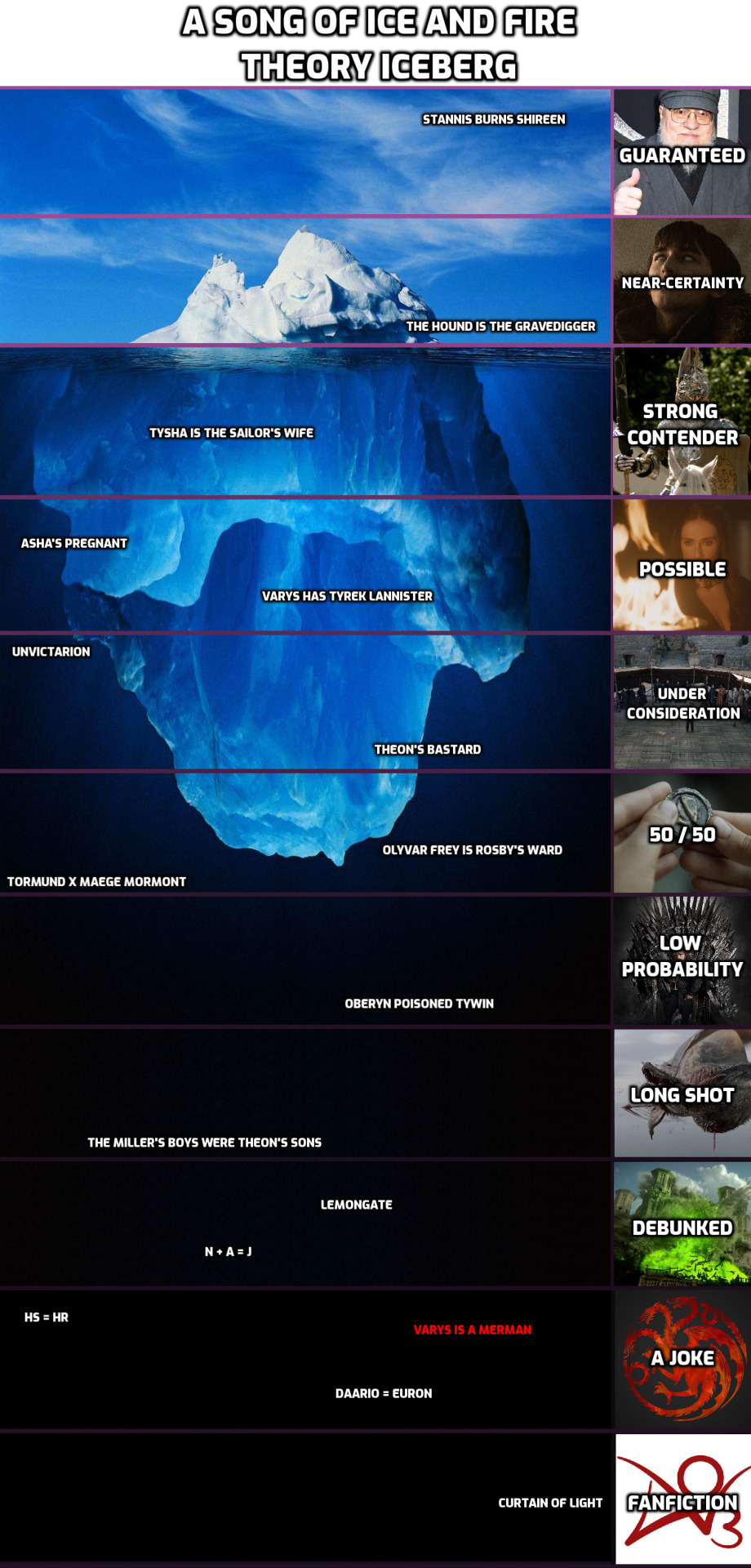
THEORY:
Varys is a merman
TIER:
Joke: These theories are an absolute joke; anyone who believes them is a fool.
[Tier list overview]
EVIDENCE:
What's the theory?
Varys is a merman. He's part human, part fish.
That's it, that's the theory.
Why are we doing this?
Despite this being one of the dumbest theories to ever emerge from this fandom, it has somehow still gained traction.

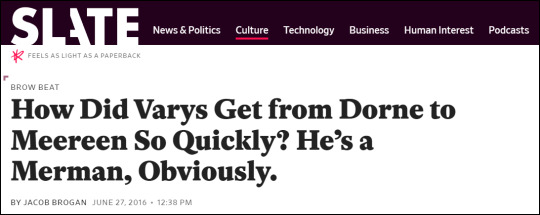

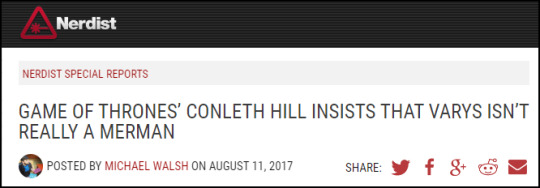

Therefore, we find ourselves obligated to address this utter stupidity.
Proof?* (*We'll use this term loosely.)
Merlings may potentially exist.
Mormont was deaf to the edge in his voice. "The fisherfolk near Eastwatch have glimpsed white walkers on the shore."
This time Tyrion could not hold his tongue. "The fisherfolk of Lannisport often glimpse merlings." - Tyrion III, AGOT
We also learn about squishers: big-headed, scaly, white aquatic creatures that kidnap children, and that kind of sounds like Varys.
"Squishers?" Brienne gave him a suspicious look.
"Monsters," Nimble Dick said, with relish. "They look like men till you get close, but their heads is too big, and they got scales where a proper man's got hair. Fish-belly white they are, with webs between their fingers. They're always damp and fishy-smelling, but behind these blubbery lips they got rows of green teeth sharp as needles. Some say the First Men killed them all, but don't you believe it. They come by night and steal bad little children, padding along on them webbed feet with a little squish-squish sound. The girls they keep to breed with, but the boys they eat, tearing at them with those sharp green teeth." He grinned at Podrick. "They'd eat you, boy. They'd eat you raw." - Brienne IV, AFFC
Varys is a trained mummer. He is a master of disguise who can alter his voice, gait, smell, and overall appearance.
The eunuch looked at him curiously, tilting his head. "When I was a young boy, before I was cut, I traveled with a troupe of mummers through the Free Cities. They taught me that each man has a role to play, in life as well as mummery. So it is at court. The King's Justice must be fearsome, the master of coin must be frugal, the Lord Commander of the Kingsguard must be valiant … and the master of whisperers must be sly and obsequious and without scruple. A courageous informer would be as useless as a cowardly knight." - Eddard XV, AGOT
Varys has a slimy smile, a hairless scalp, smooth skin, and no genitalia.
"Why are you so helpful, my lord Varys?" he asked, studying the man's soft hands, the bald powdered face, the slimy little smile. - Tyion II, ACOK
Varys was portrayed as asexual in the TV show, and there are hints that his character is similar in the books, possibly implying an exclusive interest in other fish people.
When I see what desire does to people, what it's done to this country, I am very glad to have no part in it. Besides, the absence of desire leaves one free to pursue other things. - S04E06
Varys' bedchamber doesn't seem particularly cozy, which might suggest he's actually sleeping in the sea.
"They are humble. Excessively so, in truth." Tyrion had waited until Varys was summoned by his father before slipping in to pay him a visit. The eunuch's apartments were sparse and small, three snug windowless chambers under the north wall.
[...]
"There was water in your flagon, gods have mercy," he went on, "your sleeping cell is no wider than a coffin, and that bed . . . is it actually made of stone, or does it only feel that way?"
Varys closed the door and barred it. "I am plagued with backaches, my lord, and prefer to sleep upon a hard surface." - Tyrion II, ASOS
This exchange.
He pressed his fingers into his temples. "I told them to throw Allar Deem into the sea. I am sorely tempted to do the same with you."
"You might be disappointed by the result," Varys replied. "The storms come and go, the waves crash overhead, the big fish eat the little fish, and I keep on paddling. Might I trouble you for a taste of the wine that Lord Slynt enjoyed so much?" - Tyrion II, ACOK
Whatever argument this individual is attempting to make:

Other things to consider:
In Sanskrit, "vari" translates to "water."
Varys claims to have become a eunuch in Myr (Get it??).
Littlefinger hires The Merling King, a trading galley, possibly signaling his future victory over Varys.
In the television series, Varys survived a ship sinking while others drowned:

COUNTER-EVIDENCE:
No, he's not.
STUMPY'S THOUGHTS:

VOTE:
I welcome discussions. Feel free to reblog, respond, or challenge my perspective—I won't be offended by any of it.
Please note, if "no" is the eventual winner, or if it's competitive, a second poll will be conducted to determine the proper location.
Don't even think about it.
NEXT THEORY:
Cersei is the YMBQ
[Main menu]
47 notes
·
View notes
Text
“Her hair was full of sunlight, but there was mockery in her smile. "When you play the game of thrones, you win or you die," she whispered. ”
- Eddard XV, AGOT
5 notes
·
View notes
Text
He damned them all: Littlefinger, Janos Slynt and his gold cloaks, the queen, the Kingslayer, Pycelle and Varys and Ser Barristan, even Lord Renly, Robert's own blood, who had run when he was needed most. Yet in the end he blamed himself. "Fool," he cried to the darkness, "thrice-damned blind fool." (Eddard XV, AGOT)
"Weese," she would whisper, first of all. "Dunsen, Chiswyck, Polliver, Raff the Sweetling. The Tickler and the Hound. Ser Gregor, Ser Amory, Ser Ilyn, Ser Meryn, King Joffrey, Queen Cersei."...On the road Arya had felt like a sheep, but Harrenhal turned her into a mouse. She was grey as a mouse in her scratchy wool shift, and like a mouse she kept to the crannies and crevices and dark holes of the castle, scurrying out of the way of the mighty (Arya II, ACOK)
Valiant Ned's precious little girl
#arya stark#eddard stark#ned stark#asoiaf#a song of ice and fire#how people claim that Arya and Ned aren't alike I'll never know#even their mannerisms are similar#he isn't the calm cool politician that fandom pretends he is#anyways I love this parallel between them#it highlights that Arya's list isn't about vengeance#it's a coping mechanism to deal with the stressful/dangerous situation both Ned and Arya find themselves in#and at the root of it for both of them is guilt and the feeling of helplessness#Arya holds onto that list because she very often has no way to fight back and defend herself or others#oh wow a child in an active warzone who was taken as a POW wants the people who hurt her and her pack to pay what a monster 🙄#anyway Arya is called Valiant Ned's precious little girl for a reason
47 notes
·
View notes
Note
Jon is said to be called black heart bastard in books. Besides him Rhaegar, Jaime, Bronn and Brown Ben Plumm are mention to have black hearts. Melisandre told Davos that Others also have black heart. Do you think it's implying about treachery and duplicity in these characters?
Oh, let's do it the old-fashioned way and just check out Every Single Mention! :)
One thing that stands out is that the black heart is usually assigned in an accusatory manner by a different character, so the connotation to treachery or cruelty is definitely an in-universe trope, while at the same time creating some fun parallels between those so described.
Black hearts a-plenty. Lots of quotes.
"Rhaegar … Rhaegar won, damn him. I killed him, Ned, I drove the spike right through that black armor into his black heart, and he died at my feet. They made up songs about it. Yet somehow he still won. (AGOT, Eddard X)
-> Dead, yet triumphant. An armored heart.
So many dead, so very many. Their corpses hung limply, their faces slack or stiff or swollen with gas, unrecognizable, hardly human. The garments the sisters took from them were decorated with black hearts, grey lions, dead flowers, and pale ghostly stags. (ACOK, Tyrion XV)
-> A sigil worn by the dead.
Styr scowled. "His heart may still be black."
"Then cut it out." (ASOS, Jon II)
-> A mark of treachery. In need of killing.
"So tell me, Ser Davos Seaworth, and tell me truly—does your heart burn with the shining light of R'hllor? Or is it black and cold and full of worms?" [...] It is well you did not lie to me. I would have known. The Other's servants oft hide black hearts in gaudy light, so R'hllor gives his priests the power to see through falsehoods." She stepped lightly away from the cell. "Why did you mean to kill me?" (ASOS, Davos III)
-> Treacherous, in opposition to fire, with ill intent.
"Why? Is it your fault that Bronn's an insolent black-hearted rogue? He's always been an insolent black-hearted rogue. That's what I liked about him." (ASOS, Tyrion IX)
-> A mark of disloyalty.
Ser Brynden laughed again. "Much as I would welcome the chance to take that golden sword away from you and cut out your black heart, your promises are worthless. I would gain nothing from your death but the pleasure of killing you, and I will not risk my own life for that . . . as small a risk as that may be." (AFFC, Jaime VI)
-> A mark of treachery. In need of killing.
Jon felt as stiff as a man of sixty years. Dark dreams, he thought, and guilt. His thoughts kept returning to Arya. There is no way I can help her. I put all kin aside when I said my words. If one of my men told me his sister was in peril, I would tell him that was no concern of his. Once a man had said the words his blood was black. Black as a bastard's heart. (ADWD, Jon VI)
-> A mark of treachery (against his family) caused by torn loyalty (between the Watch and the Starks).
"Ser Grandfather knows how to count. The Second Sons have gone over to the Yunkai'i." Daario turned his head and spat. "That's for Brown Ben Plumm. When next I see his ugly face I will open him from throat to groin and rip out his black heart." (ADWD, Daenerys VI)
-> A mark of treachery. In need of killing.
A horn of mead was never far from his hand, so the spittle he sprayed when making threats was sweet with honey. He called Jon Snow a craven, a liar, and a turncloak, cursed him for a black-hearted buggering kneeler, a robber, and a carrion crow, accused him of wanting to fuck the free folk up the arse. Twice he flung his drinking horn at Jon's head, though only after he had emptied it. (ADWD, Jon XI)
-> Variety! An unrelenting negotiator with high demands who cannot be moved. Treacherous only in the expectations of generosity placed on him, not in true falseness.
Ghost came racing from the gate. Tormund's horse shied so hard that the wildling almost lost his saddle. "Naught to be feared?" Jon said. "Ghost, stay."
"You are a black-hearted bastard, Lord Crow." Tormund Horn-Blower lifted his own warhorn to his lips. The sound of it echoed off the ice like rolling thunder, and the first of the free folk began to stream toward the gate. (ADWD, Jon XII)
-> Same as above: Unrelenting, intimidating, stern.
Bonus Black-heartedness:
The Hoares
The west coast of the North has also oft been beset by reavers, and several of the Hungry Wolf's wars were forced upon him when longships out of Great Wyk, Old Wyk, Pyke, and Orkmont descended upon his western coasts beneath the banners of Harrag Hoare, King of the Iron Islands. For a time the Stony Shore did fealty to Harrag and his ironmen, swathes of the wolfswood were nothing but ashes, and Bear Island was a base for reaving, ruled by Harrag's black-hearted son, Ravos the Raper.
(The World of Ice and Fire - The North: The Kings of Winter)
Archmaester Hake tells us that the kings of House Hoare were, "black of hair, black of eye, and black of heart." Their foes claimed their blood was black as well, darkened by the "Andal taint," for many of the early Hoare kings took maidens of that ilk to wife. True ironborn had salt water in their veins, the priests of the Drowned God proclaimed; the black-blooded Hoares were false kings, ungodly usurpers who must be cast down. (The World of Ice and Fire - The Iron Islands: The Black Blood)
-> A mark of cruelty as well as treachery and illegitimacy. In need of killing. (Historically opposed to the dragons.)
The Heart of Old Volantis
Who built it? When? Why? Most maesters accept the common wisdom that declares it to be of Valyrian construction, for its massive walls and labyrinthine interiors are all of solid rock, with no hint of joins or mortar, no chisel marks of any kind, a type of construction that is seen elsewhere, most notably in the dragonroads of the Freehold of Valyria, and the Black Walls that protect the heart of Old Volantis.
(The World of Ice and Fire - The Reach: Oldtown)
They must have a library in Old Volantis, surely. I may find a better copy there, if I can find a way inside the Black Walls to the city's heart. (ADWD, Tyrion IV)
One looked toward the Long Bridge and the black-walled heart of Old Volantis across the river. (ADWD, Tyrion VII)
-> A black heart may simply be armored in black, protecting what is within.
So a black heart does, indeed, indicate treachery and duplicity, mortal animosity, often in opposition to a fire-related enemy. It can also indicate illegitimacy, and it carries a strong connotation with death, though in the case of Ben Plumm it is survival he champions. It may indicate a "wall" or "armor" around the true intentions of the heart, similarly to a metaphorical Wall of Ice.
Honorable mention: Dark Heart
One spoke with the timbre of a child. The floating heart pulsed from dimness to darkness. [...] Perched above her, the dragon spread his wings and tore at the terrible dark heart, ripping the rotten flesh to ribbons, and when his head snapped forward, fire flew from his open jaws, bright and hot. (ACOK, Daenerys IV)
-> In opposition to Daenerys and her dragons.
The dwarf woman studied her with dim red eyes. "I see you," she whispered. "I see you, wolf child. Blood child. I thought it was the lord who smelled of death . . ." She began to sob, her little body shaking. "You are cruel to come to my hill, cruel. I gorged on grief at Summerhall, I need none of yours. Begone from here, dark heart. Begone!" (ASOS, Arya VIII)
-> A child. A wolf child. A dark heart.
Or, interestingly distinct: Heart of Darkness
At her command, one produced an iron key. The door opened, hinges shrieking. Daenerys Targaryen stepped into the hot heart of darkness and stopped at the lip of a deep pit. Forty feet below, her dragons raised their heads. Four eyes burned through the shadows—two of molten gold and two of bronze. (ADWD, Daenerys II)
-> Where dragons dwell.
Most sinister of all the sorcerers of Asshai are the shadowbinders, whose lacquered masks hide their faces from the eyes of gods and men. They alone dare to go upriver past the walls of Asshai, into the heart of darkness.
On its way from the Mountains of the Morn to the sea, the Ash runs howling through a narrow cleft in the mountains, between towering cliffs so steep and close that the river is perpetually in shadow, save for a few moments at midday when the sun is at its zenith. In the caves that pockmark the cliffs, demons and dragons and worse make their lairs. The farther from the city one goes, the more hideous and twisted these creatures become...until at last one stands before the doors of the Stygai, the corpse city at the Shadow's heart, where even the shadowbinders fear to tread. Or so the stories say.
(The World of Ice and Fire - The Bones and Beyond: Asshai-by-the-Shadow)
-> A place of demons, dragons "and worse". A place of corpses. Marked by the run of a river named Ash, a city named Stygai. Truly stygian.
Far be in from me to cast aspersions (Lies, I love casting those.) but given that Jon is associated with the term most frequently, I'd suspect he will end up playing a role in opposition to a fire-related enemy, who will want him dead, guarding his heart's true intentions behind a black armor and plotting with ill intent. Perhaps accused of trying to be a usurper, perhaps accused of demanding too much, perhaps trying to reconcile a taint in his blood with his loyalty to the Starks.
#rouka queue#long post#quote compilation#black heart#jon snow#parallels#anti daenerys targaryen#not really but you know
67 notes
·
View notes